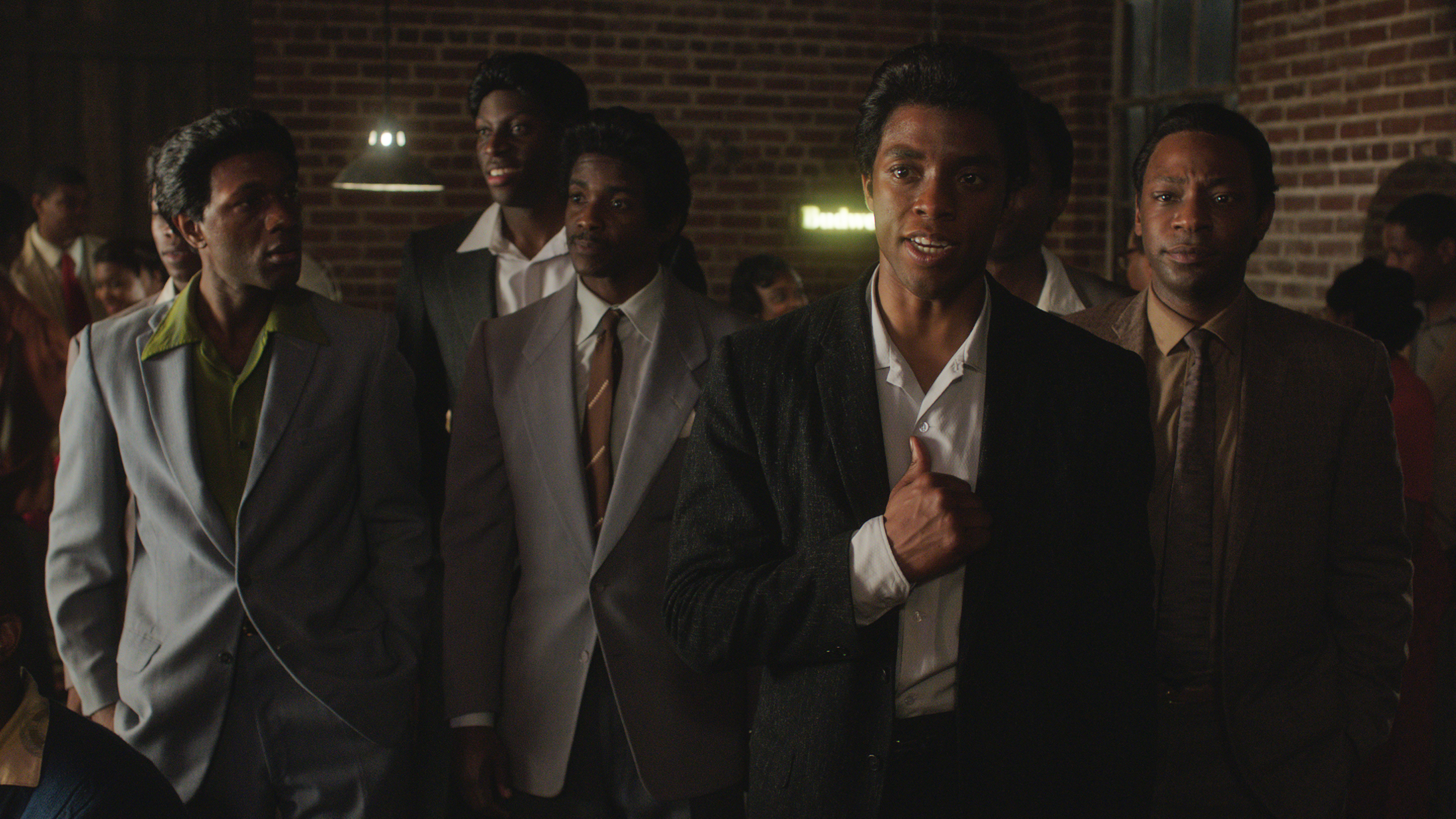It would seem the biggest risk for Get On Up should be finding someone who can capture the magnetism and style of James Brown, the Godfather of Soul. In Chadwick Boseman, Get On Up hits a grand slam; Boseman electrifies when on screen. However, Tate Taylor’s direction disservices the amazing transformation of its lead and solid acting across the board. At least you’ll get a better picture of who James Brown is.
Get On Up travels across the entirety of James Brown’s (Chadwick Boseman) life. We see the child left by his mother (Viola Davis), father (Lennie James), and surrogate mother (Octavia Spencer). We see Brown meet with Bobby Byrd (Nelsan Ellis), his right hand man, in prison. Brown transforms the music business with partner Ben Bart (Dan Aykroyd), and wow the world with his music and dance moves. We also witness some of Brown’s warts: he openly clashed with band members referencing HIS own relative popularity frequently. Domestic abuse was passed from Brown’s father to the man himself. Finally, he openly abused drugs in his later years. Get On Up tries its best to find parallels between all of Brown’s behaviors to give the audiences as clear a picture of a complicated man as they can.
Director Tate Taylor (The Help) overdirects Get On Up. The time shifts happen when Taylor feels it is necessary in the movie. As a result, the storytelling jarringly jumps time periods past to future to present back to past in quick succession. Taylor also breaks the 4th wall and has Brown talk directly to the audience out of convenience, a condescending cheat at best. Time should be the through line for Get On Up with maybe a time jump or two; multiple jumps eliminate narrative momentum and made the director’s points cloudy at best. In addition, Brown’s life is cherry picked and misses some key context, such as when he alienated fans by endorsing Richard Nixon. Such events would paint a more complete picture of the man: a wasted opportunity by Taylor.
Fortunately, Chadwick Boseman spices the proceedings. Whenever Brown is on stage, which is early and often, Get On Up swaggers with style. The dance moves are slick even for today: Mick Jagger to Bruno Mars openly steal from Brown’s act (credit to Boseman for nailing each of these). There’s even a nice call out to when Brown outperformed Jagger at a concert where he and the Stones played on the same night. The music sizzles with energy and magic, as if we get a glimpse of a genius out of time. The flashbacks give context to Brown’s shortcomings of his later years, and Boseman acts the hell out of just how narcissistic and above morality Brown felt he was. Boseman COMMANDS the screen as Soul’s Godfather. He nails Brown’s inner workings: when people explain to him how things have to be, Brown is working on how to create something transcendent. This drive has positive and negative consequences, and Boseman makes sure to highlight exactly what those consequences are.
Supporting Boseman is a mostly underused but excellent bench of support. Nelsan Ellis, in one great scene, proves his worth as Bobby Byrd, explaining why he sticks with Brown through thick and thin. Brandon Smith does solid work playing Little Richard in one key scene. Viola Davis, Lennie James, and Octavia Spencer take one note limited roles and provide necessary context to Brown’s backstory. Dan Aykroyd is also alright at Brown’s Jewish partner. The rest of the cast is mostly underused with negative effect on the story. We only get brief glimpses of Brown’s home life and band members, only when necessary to generate conflict.
Chadwick Boseman is definitely unafraid of playing larger than life figures. He did ok work as Jackie Robinson in 42, but he found his calling playing James Brown in Get On Up. Maybe we can team up Boseman with Dave Chappelle to tell the Rick James Brown Chronicles. I’d pay a dollar to see that.

